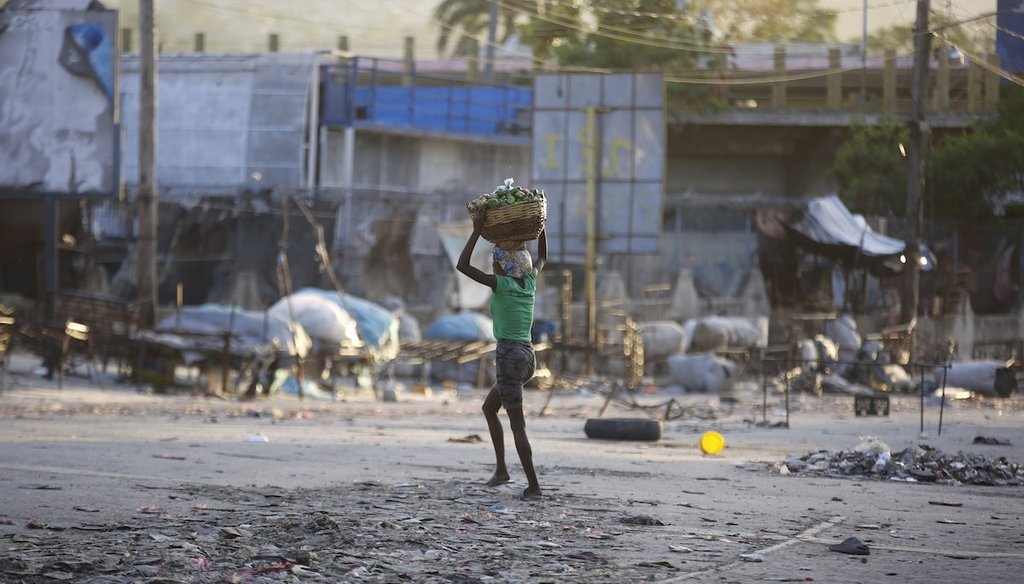Stand up for the facts!
Our only agenda is to publish the truth so you can be an informed participant in democracy.
We need your help.
I would like to contribute

Residents flee their homes because of gang violence Feb. 29, 2024, in Port-au-Prince, Haiti’s Portail neighborhood. (AP)
Videos of people fleeing the sounds of gunshots, images of buildings on fire and headlines of political unrest in Haiti have increased over several weeks.
Violence escalated after a coalition of gangs began attacking Haiti’s capital, Port-Au-Prince, forcing acting Prime Minister Ariel Henry to resign. He’d assumed the role after President Jovenel Moïse was assassinated in 2021.
Amid the real images of chaos lurks a gruesome, unfounded narrative about a culture of cannibalism in Haiti.
The Daily Star, a British tabloid, helped kick-start the panic with a March 5 story that said Haitian "cannibal gangs" are "eating people they've killed," citing an anonymous Haitian journalist.
Conservatives with verified accounts and large platforms, including Elon Musk, the owner of X, amplified the unverified claims on social media and warned of an "invasion" of Haitian cannibals in the U.S.
"There are cannibal gangs in Haiti who abduct and eat people," Ian Miles Cheong, a right-wing commentator, posted on X on March 6. "Reminder that these people are now illegally entering the U.S. en masse," he added.
Sign up for PolitiFact texts
Online posts in Spanish used the same videos with similar comments.
The online rumors coincide with former President Donald Trump comparing migrants to Hannibal Lecter, the serial killer and cannibal character in "The Silence of the Lambs," during presidential campaign rallies.
These posts, however, do not offer evidence that Haitians in the country, or Haitians seeking asylum in the U.S., are practicing cannibalism. The videos Musk and others have shared include outdated videos that either couldn’t be verified or were taken in other countries.
The State Department told PolitiFact that it has received no credible reports about cannibalism in Haiti, and experts who study the country said they’ve seen no sign that cannibalism is prevalent among gangs or the population at large.
"There is ZERO evidence that any cannibalism is taking place now, or ever has occurred in the past, in Haiti," Marlene Daut, a Yale University professor and Caribbean historian, wrote in an email. "There is similarly absolutely no evidence that Haitians migrants to the U.S. seeking asylum are ‘cannibalists.’ Those claims are, of course, patently racist and stem from longstanding efforts by white supremacists to dehumanize Haiti and Haitians."
What the videos showed
Several videos shared to support the cannibal claims are not connected to Haiti or the current unrest.
For example, one video’s depiction of roasting corpses was footage of Halloween decorations at a Chinese theme park in 2018, Snopes reported.
Another account shared footage from a 2017 CNN documentary series that interviewed a member of a Hindu sect that includes postmortem cannibalism in its religious practices. The years-old interview is from India.
We could not verify another video that appears to show cannibalism. NBC News reported the video had been online "for two years or longer." Some X users claimed the clip showed a battle between two gangs in Haiti’s Artibonite Valley. An extensive Google and Nexis search of news articles yielded no evidence of cannibalism in that area. A United Nations report of violence in the region detailed accounts of "extreme brutality" by gangs, but did not mention cannibalism.
International groups and governments have documented violence in Haiti for decades, publishing extensive reports of the gangs’ violent tactics, which include extortion, indiscriminate murders, kidnappings and rape. PolitiFact found no descriptions of cannibalism.
One of Haiti’s most prominent gang leaders, Jimmy Chérizier, goes by the alias "Barbecue" — which is boosting the cannibalism talk. Chérizier told The Associated Press in 2019 that he got his nickname as a child because his mother was a street vendor who sold fried chicken. Although there is plenty of information about Chérizier’s violent tactics — the United Nations sanctioned him over human rights violations — no sources include cannibalism.
History of cannibalism claims in Haiti
Narratives painting Haiti as a barbarous country of cannibals are not new.
"These kinds of claims have a long and deep history, and they tend to say more about the people who make them than they do about Haiti itself," said Laurent Dubois, a University of Virginia historian. "There is probably no country in the world that has had more misrepresentations projected onto it than Haiti."
The origin of "cannibal" traces back to Italian explorer Christopher Columbus’ voyages in the late 15th century, Dubois said. It came up "out of a misheard indigenous term (Columbus) encountered in 1492 when he disembarked in the north of what is now Haiti," Dubois said.
Stories of cannibalism in Haiti have circulated since.
In 2013, historian Mike Dash detailed the story of an 1860s trial over a child’s murder and cannibalism for Smithsonian magazine. The case "helped define attitudes toward the nation and the (Vodou) religion ever since," Dash wrote. Haitian Vodou, rooted in a blend of Catholicism and Western and Central African spirituality, was influenced by escaped slaves in the 17th century who wanted to unite under a common spiritual identity.
Neither Haitian culture nor island religious practices support "anything similar to cannibalism," said Athena Kolbe, a social work professor at Barry University and the Institute of Social Work and Social Science in Haiti.
Kate Ramsey, a University of Miami history professor, said, "Such tropes go back to the nineteenth century when, following the Haitian Revolution, colonialist and anti-abolitionist detractors sought to discredit Black self-governance in Haiti through claims about the decline of ‘civilization’ in the second independent nation in the hemisphere and the first to permanently abolish slavery."
Experts pointed to the 19-year U.S. occupation of Haiti between 1915 to 1934 as another flashpoint. U.S. forces were accused of committing atrocities against Haitian people, including shooting civilians, forcing labor and enforcing martial law for long stretches of time.
"The proliferation of negative images about Haiti’s culture played a role in justifying the abuses carried out by the U.S.," the University of Virginia’s Dubois said.
Unfounded claims of cannibalism in Haiti foment fear of Haitians, especially of ones fleeing brutal violence.
There is a "deep set of unconscious ideas about Haiti that have been developed over a long history," Dubois said. And people should be aware of it "to avoid just falling into recycling old and misleading stereotypes."
Our Sources
Elon Musk X post, March 11, 2024
X post, March 6, 2024
X post, March 12, 2024
Instagram post, March 13, 2024
The Daily Star, "Haiti cannibal gang are 'eating people they've killed' on the streets as violence erupts", March 5, 2024
Snopes, Viral Video Shows 2 Haitian Corpses Roasting Over an Open Fire?, March 13, 2024
CNN, Face to face with a cannibalistic sect, Jan. 20, 2017
Global Initiative Against Transnational Organized Crime, Gangs of Haiti, October 2022
Wilson Center, Gang Rule, Gang Killings in Haiti, April 25, 2023
Revisiting Haiti´s Gangs and Organized Violence, June 2013
The Washington Post, The U.S. has tried to ‘fix’ Haiti before. How will this time be different?, March 16, 2024
The Libertarian Institute, Culture Warriors Spread Disinfo on ‘Haitian Cannibals’, March 14, 2024
The United Nations, CRIMINAL VIOLENCE EXTENDS BEYOND PORT-AU-PRINCE, November 2023
NBC News, Elon Musk and right-wing influencers use ‘cannibal’ claims to smear Haitian migrants amid crisis, March 13, 2024
The Associated Press, Leader or killer? A day with ‘Barbecue’ in Haiti’s capital, June 7, 2019
United Nations, Jimmy Cherizier, Accessed March 18, 2024
The Washington Post, How the gang leader ‘Barbecue’ became one of Haiti’s most powerful men, March 14, 2024
The Smithsonian Magazine, The Trial That Gave Vodou A Bad Name, May 29, 2013
The New York Times, Invade Haiti,Wall Street Urged.The U.S. Obliged., May 20, 2022
Email interview with Laurent Dubois, history professor at the University of Virginia and specialist on Haiti, March 15, 2024
Email interview with the U.S. State Department press office, March 18, 2024
Email interview with Marlene Daut Yale University professor and Caribbean historian, March 18, 2024
Email interview with Kate Ramsey history professor at the University of Miami, March 18, 2024
Email interview with Athena Kolbe, social work professor at Barry University and the Institute of Social Work and Social Science in Haiti, March 18, 2024
Phone interview with Jean Marc Brissau, University of Notre Dame graduate programs manager and former Haiti Program country director, March 18, 2024











































